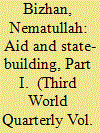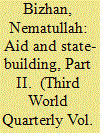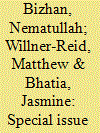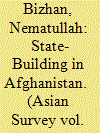| Srl | Item |
| 1 |
ID:
158651


|
|
|
|
|
| Summary/Abstract |
Under what conditions does foreign aid in the aftermath of war foster state-building? This article argues that institutional legacy and continuity and the politics of aid may matter. In the aftermath of war, for an aid regime to reinforce state-building, it may need to ensure continuity in the strength of the state and to use recipient mechanisms and finance policies that generate a greater state capacity. The existence and continuity of a Weberian state may increase the likelihood of effective state-building. If the state is relatively strong, with a Weberian bureaucracy, aid can further reinforce it when aid is spent through national systems or is aligned with local priorities, with efforts to ensure that the recipient leaders reinforce state effectiveness by implementing policies that may require greater state capacity. Evidence for this argument is provided through pairwise comparison of state-building patterns between South Korea and Taiwan.
|
|
|
|
|
|
|
|
|
|
|
|
|
|
|
|
| 2 |
ID:
158652


|
|
|
|
|
| Summary/Abstract |
Part I of this article found that, in South Korea and Taiwan, institutional legacy and continuity as well as the politics of aid did matter for post-war state-building. The inheritance and continuity of Weberian states and the receipt of aid either as budget support or increasingly aligned with local priorities helped to foster state-building. Part II of the study in this article explores a different dynamic of post-war aid to Afghanistan and Iraq which had a legacy of neopatrimonial and weak states. It argues that under more adverse initial conditions – for a neopatrimonial state – the role of aid regime and state-building strategies become even more important. Under these conditions, aid and state-building strategies may undermine state-building if they induce discontinuity in the existing state capacity and create parallel institutions to those of the state. Depending on the policies, state weakness may be reinforced if leaders are preoccupied with the politics of patronage.
|
|
|
|
|
|
|
|
|
|
|
|
|
|
|
|
| 3 |
ID:
163220


|
|
|
| 4 |
ID:
163221


|
|
|
|
|
| Summary/Abstract |
This article examines post-2001 state-building in Afghanistan. In so doing, it explores how interactions among aid, politics, and state capacity shaped the characteristics of the state by looking at the existing conditions, sources of state income, the development planning process, aid coordination and alignment, and interventions in building state capacity.
|
|
|
|
|
|
|
|
|
|
|
|
|
|
|
|